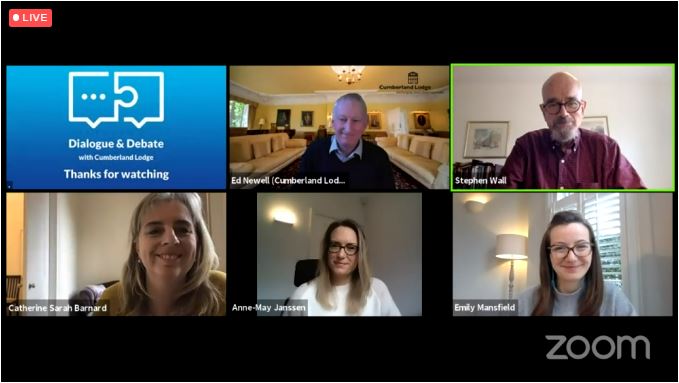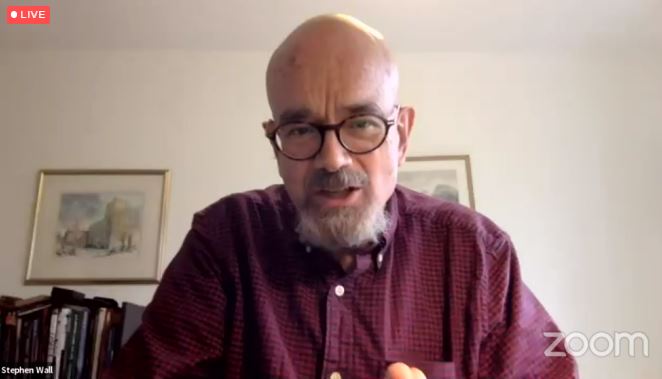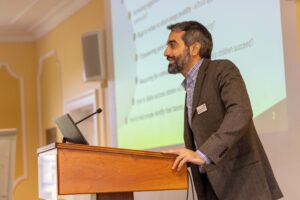On 3 February 2021 Cumberland Lodge hosted a webinar on Brexit – What next?, chaired by Chief Executive, Dr Ed Newell, as part of its Dialogue & Debate series.
The following speakers contributed to the webinar:
- Professor Catherine Barnard FBA FLSW – Deputy Director at academic think-tank The UK in a Changing Europe
- Anne-May Janssen – Head of European Engagement at Universities UK International
- Emily Mansfield – Principal Economist for Europe at the Economist Intelligence Unit
- Sir Stephen Wall – Formerly the UK’s Permanent Representative to the EU and Tony Blair’s senior advisor on EU matters.
The discussion set out to address two key themes: the UK’s sense of identity and belonging, and its relationship with other countries. Within those themes, several sub-themes emerged.
UK-EU relations
The first of these themes was the UK’s future relationship with the EU. Emily Mansfield helpfully set the scene by explaining that 15% of our exports go to the United States, whereas about 50% go to the EU, making it by far our biggest partner. Sir Stephen suggested that our economic interest will always point us back to the EU. This being the case, one might have hoped for a more positive start to the post-Brexit relationship between the UK and the EU.
Professor Catherine Barnard looked at the past two months and, on this basis, predicted a fractious, difficult and acrimonious relationship. For instance, she thought it was very unfortunate that the UK had decided not to give full ambassadorial status to the EU representative in the UK, and that the EU Commission had invoked Article 16 of the Northern Ireland Protocol to place controls on the export of COVID-19 vaccines to Northern Ireland, which, she added, ought to be seen as a ‘nuclear weapon’ and treated with great care.
Beyond our relationship with the EU, the panel spoke about pressures arising in the area of cyber-security, and the need to define clear boundaries when it comes to our post-Brexit trading relationships with countries such as China, citing the Chinese Government’s genocidal campaign against the Uyghurs as an example.

On a soft power and cultural/educational exchange level, Janssen talked listeners through the implications of the UK’s departure from the Erasmus exchange programme, which she says was ultimately dropped, as it would have cost £300 million (net) to maintain, post-Brexit. She said the UK was not very good at sending students abroad, and there could also be a negative impact on diversity on university campuses if not as many students came to the UK to study.
Janssen and Professor Barnard then discussed the new Turing Scheme for global student mobility, which has replaced the Erasmus scheme. The Turing Scheme is currently supported by one year of initial funding, around which not much information has been published by the Government. The panellists felt it was important for the funding capacity and the duration of the scheme to be expanded, if it is to be of substantive value for students.

Devolution
Secondly, the panel spent a significant amount of time on devolution – the ongoing process of moving decision-making power to separate local legislatures and executives in Scotland, Wales and Northern Ireland. Indeed, devolution slowly became the dominant motif of the webinar, blending in with other themes, such as the UK’s relationship with the EU.
As Sir Stephen put it, ‘devolution will be, post-COVID, our dominant national story for years’. The panel agreed that serious thought ought to be given to this if the UK wants to ‘stay together’. It was recognised that desire for independence in Scotland is very strong and can only be diminished if we offer the Scottish electorate a good reason to stay, including exploring, as Sir Stephen did, the option of transforming the House of Lords into a chamber that better reflects the UK’s devolved character.
The panel also discussed the link between Scotland’s potential bid for independence and separate EU membership. The idea is that Scottish independence might be made more attractive by the prospect of being able to (re)join the EU as a sovereign nation. However, in light of certain joining conditions (e.g., adopting the Euro currency), this could be less straightforward or attractive a route than it initially appears.
Identity politics
Thirdly, the panel acknowledged the need to move away from identity politics, which, as Sir Stephen put it, renders people ‘impervious to the factual arguments’. Professor Barnard suggested that, as far as Brexit is concerned, we are still hovering around that 50/50 mark in terms of sentiment, which suggests a deep-seated division.
Mansfield advocated moving away from the Leave-Remain narrative, towards one that focuses on uniting people around protecting the country for future generations – for example, by tackling the climate emergency. Here, a big opportunity presents itself for national unity and global leadership, especially in light of the UN Climate Change Conference (COP26) being held in Glasgow later this year.

Conclusion
In addition to these themes, the speakers offered clear and concise explanations of some of the main issues around Brexit. For instance, Professor Barnard succinctly analysed the challenges surrounding the Northern Irish border issue (which she referred to as ‘systemic’), and explained the different permutations there could have been under different types of trading agreement.
As such, the webinar presented an enjoyable and educational combination of expert-led conversation, an exchange of ideas, and an exploration of the shared view that Brexit has put into sharp relief some deep-seated domestic challenges, which must be addressed sooner rather than later. To successfully meet these challenges in the future, however, the UK and the EU will first need to positively engage on many more ‘mundane’ regulatory issues over the next few years, in the immediate aftermath of Brexit.



